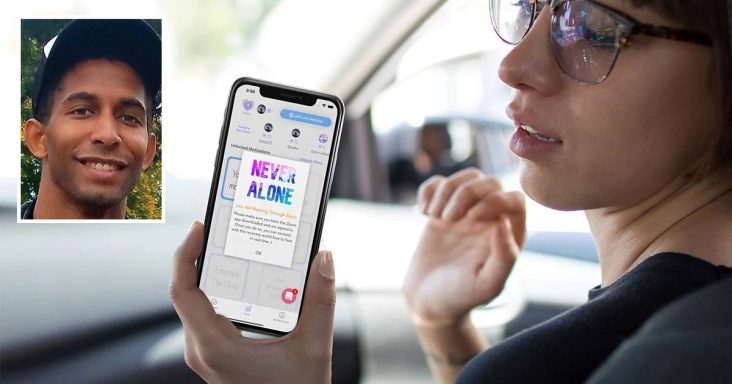Sober Sidekick receives investment from High Street Equity Partners
by July 25, 2024 5:13 pm 493 views

Chris Thompson (inset) with the Sober Sidekick app
High Street Equity Partners, with offices in Little Rock and Washington, D.C., is an investment partner in a $2.5 million seed round for Northwest Arkansas-based healthcare startup Sober Sidekick, according to a recent news release.
Bentonville entrepreneur Chris Thompson is the founder and CEO of Sidekick Mobile Technologies, creator of Sober Sidekick. The sobriety and recovery smartphone app helps people struggling with addiction or recovering from alcohol or drug abuse. Thompson said he was excited that many companies that recently invested in Sober Sidekick have a presence in Northwest Arkansas.
“It’s really adding gas to the fire that’s already been lit in terms of serving more people worldwide,” said Thompson, adding that it’s allowed the startup to make “key hires in order to integrate ourselves into healthcare, whether it be Medicaid plans or employers or so on. Really exciting time for us.”
Other investors in the $2.5 million seed round included HealthX Ventures, Nina Capital, 46 VC, American Heart Association and former regional Humana CEO Michael Brouthers. The fundraising round was completed about a month ago.
“Sober Sidekick is an emerging leader within the $43 (billion) U.S. addiction recovery market,” according to the release. “Sober Sidekick’s platform leverages a mobile-first AI-driven approach, utilizing gamified peer-to-peer support to enhance addiction recovery outcomes. The company’s ‘empathy algorithm’ ensures that each member receives immediate peer support, boasting an industry-leading response rate. This personalized support system has fostered a thriving community of over 500,000 members and growing. Their growth is a testament to the platform’s effectiveness and the team’s strategic insight.”
The release shows that High Street Equity Partners is excited about Thompson’s “profound understanding of the challenges faced by individuals in recovery, stemming from his own personal journey with addiction. Chris’s dedication to creating a supportive and effective platform is reflected in his leadership and the company’s innovative approach to addiction recovery. The company operates under a revenue model that aligns with its success with the recovery success of its users, embodying its commitment to positive outcomes.”
The model supports users during recovery and “provides a scalable and data-driven approach that appeals to healthcare providers and payers by reducing overall treatment costs and improving care outcomes,” the release shows.
In 2023, Harvard Business School completed a case study on Sober Sidekick’s revenue model. Last month, the startup was featured in “Fortune.” Thompson said the app was featured by Google Play on Wednesday (July 24): “We’re like the No.1 result if anyone searches ‘quit’ in the Google app store.”
So far, the startup has a contract with one health plan, AmeriHealth Caritas. Other agreements are in the works, including three more national health plans and state Medicaid plans.
According to the release, substance abuse affects 40 million Americans. However, only one in seven seek care annually and cost more than $46 billion to the healthcare system. The way substance abuse has been addressed has a 95% one-year failure rate, leading those seeking care with seven care cycles on average.
“By providing continuous engagement and predictive analytics to prevent relapses, Sober Sidekick offers a transformative approach to a persistent challenge, making a significant advance towards value-based care in healthcare.” The platform can predict relapse “with high accuracy…. The company’s innovative solutions have already demonstrated significant impact, with a 68% relapse reduction rate.”
Thompson launched the app in January 2019, just a few months after ending five years of alcohol addiction. A Pennsylvania native, he relocated to Northwest Arkansas from Los Angeles in early 2022. Sober Sidekick has four full-time employees.
